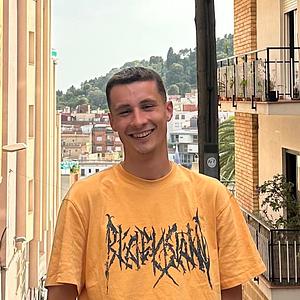
Théophile Boinnard
Nationality: Français
Education
M2 ICFP - Physique Théorique
|2022 – 2023 École Normale Supérieure Paris, Paris, France
M1 Physique Fondamentale
|2020 – 2021 École Normale Supérieure Paris-Saclay, Gif-Sur-Yvette, France
L3 Physique Fondamentale
|2019 – 2020 École Normale Supérieure Paris-Saclay, Gif-Sur-Yvette, France
Classe Préparatoire PCSI-PSI*
|2017 – 2019 Lycée Fabert, Metz, France
Professionals experiences
Stage de fin d'études
Turbulent dynamo coefficients in astrophysical plasmas.
Master project supervised by Jennifer Schober and Abhijit Bendre.
Theoretical and numerical study of the dynamo effect in astrophysical plasmas.
Master project supervised by Jennifer Schober and Abhijit Bendre.
Theoretical and numerical study of the dynamo effect in astrophysical plasmas.
Année de Recherche Pré-Doctorale à l'étranger (ARPE)
Plasma dynamics under resonant magnetic perturbations in tokamaks.
Nine months internship in the theory group of the Swiss Plasma Center, supervised by Paolo Ricci, Joaquim Loizu and António Coelho.
Three dimensional two-fluid numerical simulation of turbulent plasmas in tokamaks under resonant magnetic perturbation. Simulations carried out on supercomputers, such as Piz Daint.
An article was published in Nuclear Fusion.
Nine months internship in the theory group of the Swiss Plasma Center, supervised by Paolo Ricci, Joaquim Loizu and António Coelho.
Three dimensional two-fluid numerical simulation of turbulent plasmas in tokamaks under resonant magnetic perturbation. Simulations carried out on supercomputers, such as Piz Daint.
An article was published in Nuclear Fusion.
Stage M1
Three months internship, supervised by Victor Coco.
Experimental work on the reduction of electronic noise in the pixels of the VELO sensor of LHCb.
Development of a testing procedure for the sensor.
Experimental work on the reduction of electronic noise in the pixels of the VELO sensor of LHCb.
Development of a testing procedure for the sensor.
Stage L3
First research experience of six weeks, supervised by Marco Bomben.
Simulation work on the effects of radiation and edge damages inside silicon sensors using the TCAD software.
Simulation work on the effects of radiation and edge damages inside silicon sensors using the TCAD software.
Selected publications
Plasma turbulence simulations in a diverted tokamak with applied resonant magnetic perturbations
T. Boinnard, A. J. Coelho, J. Loizu, P. Ricci
Published in Nulcear Fusion in
Research
Current Research Fields
Work on error estimators and mesh adaptation for anisotropic finite elements applied to time-dependent partial differential equations.